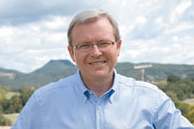China secretly funding Kevin Rudd’s economic rescue plan
26 Mar 2009
China is reported to be covertly funding Australian Prime Minister Kevin Rudd's economic rescue plan by buying Australian Treasury securities to gain the support of Australian politicians, who have in recent times been vociferously expresing concern over China's increasing financial clout and appetite for acquisitions in the country.
 An investigation into Chinese investments in Australia by the Herald Sun has shown that China's investment in Australian government bonds running into billions of dollars is being used by the government for its emergency spending.
An investigation into Chinese investments in Australia by the Herald Sun has shown that China's investment in Australian government bonds running into billions of dollars is being used by the government for its emergency spending.
The report, quoting market insiders, says that of the $2 billion in Treasury securities issued every week by the Australian government, China is believed to be buying around 15-20 per cent, thereby in all probability, making it the single biggest lender to Australia.
This startling revelation by the Herald Sun, was made after Prime Minister Kevin Rudd secretly met Li Changchun, the head of China's propaganda, media and ideology and ranked as the country's fifth-most powerful member of its nine-person ruling politburo standing committee, last Saturday at The Lodge. Though the Australian media was in the dark about the meting, the paper says the news made headlines in all TV networks across China, since only the Chinese media was allowed into The Lodge.
Barely had the meeting ended, the Chinese media flashed reports, 'Kevin Rudd promotes China's role in the IMF.'
The bond issue would leave Australia with a massive A$200-billion debt, which politicians fear would subordinate Australian national intersts to those of its biggest lender, which is also investing heavily in Australia, mainly in the minerals sector, which has caught the attention of politicians, investors and the public alike.
The recent $19.5-billion investment by China's state-owned Aluminium Corporation of China (Chinalco) in troubled mining giant Rio Tinto, (See: Chinalco invests $19.5 billion in Rio Tinto to raise stake to 18 per cent), Beijing's biggest investment ever in a foreign company, has come in for severe criticism not only from Australians, but also investors of Rio Tinto in the UK.
Many Australians are worried about the Chinese taking control of strategic mining wealth of the country. Some government officials privately confess that the increased Chinese investment is a growing concern for national security (See: Chinalco-Rio Tinto deal fuels political storm).
For instance, the Rudd government, which has banned uranium exports to India on proliferation concerns even after the signing of the Indo-US civillian nuclear cooperation, has no such qualms about supplying the nuclear raw material to China.
Rudd said that the meeting lasted for 30 minutes meeting followed by lunch, where they discussed how to expand and develop the economic, political and broader relationship.
Last night Australian politicians said that the emergence of China as a major lender needed to be weighed against the national interest. Shadow Treasurer Joe Hockey said, was quoted by the Herald Sun, "If it appears that a foreign government is the largest lender to Australia, then ultimately that weighs heavily on the national interest."
By investing heavily into US bonds, China is also trying to leverage influence in Washington, with Chinese President Wen Jiabao rebuking the US for creating the global financial crisis and asked it to put its house in order at the World Economic Forum Meet held in Geneva last month.
Apart from Chinalco's interst in Rio, Australian regulators have to pass the $2.6-billion takeover of OZ Minerals by China's Minmetals. Opposition parties have warned that if China is the country's largest lender, the criteria of being the largest lender should not go against the interest of the country.
Opponent of the Chinalco deal, Nationals Senate leader Barnaby Joyce has demanded that Rudd make the details of the meeting public and clarify whether the meeting was not held by the Chinese to lobby to clear the Chinalco-Rio deal.
China is seeking support of the Australian government to get more voting rights in the IMF, since currently, China, which is the world's third largest economy, has a 3.7 per cent voting stake, while Germany, the fourth largest economy has 6 per cent, Britain 4.9 per cent, the US has 17 per cent and India 1.9 per cent.
Responding to why the Australian media was kept in the dark about such an important meeting, Rudd told The Australian ,"It was a private meeting between the two. It is not the prime minister of Australia's role to put out a press release announcing what every visiting politician is doing."
Often taunted by opposition members for his fluency in Mandarin, Rudd is known more for his fondness of Chinese noodles than the traditional Australian roast turkey.
In another development, the paper also reported defence minister Joel Fitzgibbon's admission in parliament of two trips to China paid for "either personally or through her associated commercial interests,'' by his rich Chinese-born land lady and political benefactor Helen Liu.
He confessed to not declaring the fully funded visits on the MP's gift register of the trips made in 2002 to Beijing and Shanghai and again in 2005 to Shanghai during his term as an opposition front bencher.




















